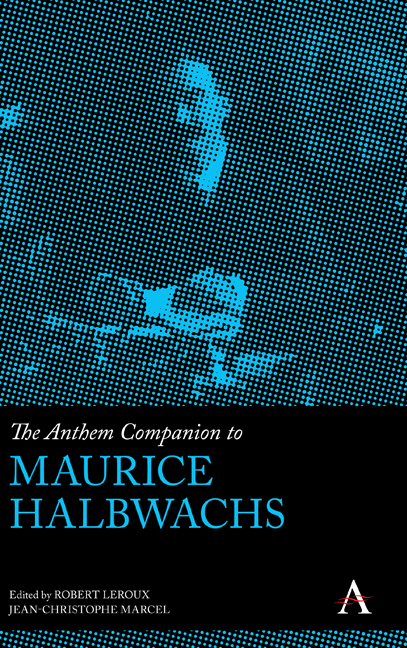Book contents
- Frontmatter
- Contents
- Introduction
- Chapter 1 A Theorist of Collective Memory
- Chapter 2 Halbwachs and the Durkheimian Perspective on History
- Chapter 3 Maurice Halbwachs, Sociologist of Memory: His Reception in Italy and the Development of the Sociology of Memory
- Chapter 4 Population as the Body of Society
- Chapter 5 Urban Morphology and Social Morphology: Marcel Roncayolo and the Work of Maurice Halbwachs
- Chapter 6 Halbwachs’s Leibniz and Halbwachs’s Sociology
- Chapter 7 Halbwachs on Quetelet and the Use of Statistics in Sociology
- Chapter 8 Maurice Halbwachs and the Sociology of Consumption and Social Classes
- Chapter 9 From Criticism of Moral to the Probalistic Test
- Chapter 10 The Age Criterion: Between Sociology and Biology
- Chapter 11 Speculation: Order or Disorder?
- List of Contributors
- Index
Chapter 2 - Halbwachs and the Durkheimian Perspective on History
Published online by Cambridge University Press: 23 February 2022
- Frontmatter
- Contents
- Introduction
- Chapter 1 A Theorist of Collective Memory
- Chapter 2 Halbwachs and the Durkheimian Perspective on History
- Chapter 3 Maurice Halbwachs, Sociologist of Memory: His Reception in Italy and the Development of the Sociology of Memory
- Chapter 4 Population as the Body of Society
- Chapter 5 Urban Morphology and Social Morphology: Marcel Roncayolo and the Work of Maurice Halbwachs
- Chapter 6 Halbwachs’s Leibniz and Halbwachs’s Sociology
- Chapter 7 Halbwachs on Quetelet and the Use of Statistics in Sociology
- Chapter 8 Maurice Halbwachs and the Sociology of Consumption and Social Classes
- Chapter 9 From Criticism of Moral to the Probalistic Test
- Chapter 10 The Age Criterion: Between Sociology and Biology
- Chapter 11 Speculation: Order or Disorder?
- List of Contributors
- Index
Summary
This chapter deals with the question of how the Durkheimians, and especially Maurice Halbwachs, react to the ascendant discipline of “scientific history.” Lacking the weapons to wage a pitched battle on the institutional front, the new-born sociology seized upon methodological arguments to counter the historians of the day. The challenge was a daunting one, for in France at the close of the nineteenth-century history was widely revered as preeminent among the social sciences (Prost 1996). From the 1880s on, problems relating to the definition of historical method sparked ongoing debates and mobilized a large portion of the French intelligentsia. Divergent interpretations faced off against each other. Not only did historical discourse undergo profound changes, but this mutation of historical science awakened interest in the social sciences as a whole. Philosophers became historians, literary critics turned into historians of literature, and the sociologists constructed their theories from historical materials.
Durkheim and his followers, grouped around the Année sociologique, shared fully in the vast heritage of historical thought. From the beginning, the effort to trace historical origins and developments brought a new depth to sociological research, which was eager to move beyond simple “journalistic” recording (Besnard 1986). We might say, in fact, that Durkheim and his disciples were attempting to apply a precise method, one that was experimental and comparative, to the concrete facts of history.
At first glance, that assertion might seem paradoxical, given the many issues on which the Durkheimians diverged from the historians. We must point out immediately that it was not the notion of history as positive knowledge that the Durkheimians were contesting, but rather the individualistic determinism of certain historians. Most of the Durkheimians seem to have recognized the importance of history, and indeed they made it one of sociology's principal “auxiliary sciences.”
Marcel Mauss frequently argued in favor of close collaboration between sociology and historical science. “A better historical description of the relationships of civilization between various societies will necessarily have an impact on our studies from many viewpoints,” he writes (Mauss 1927, 34).
- Type
- Chapter
- Information
- The Anthem Companion to Maurice Halbwachs , pp. 17 - 36Publisher: Anthem PressPrint publication year: 2021



